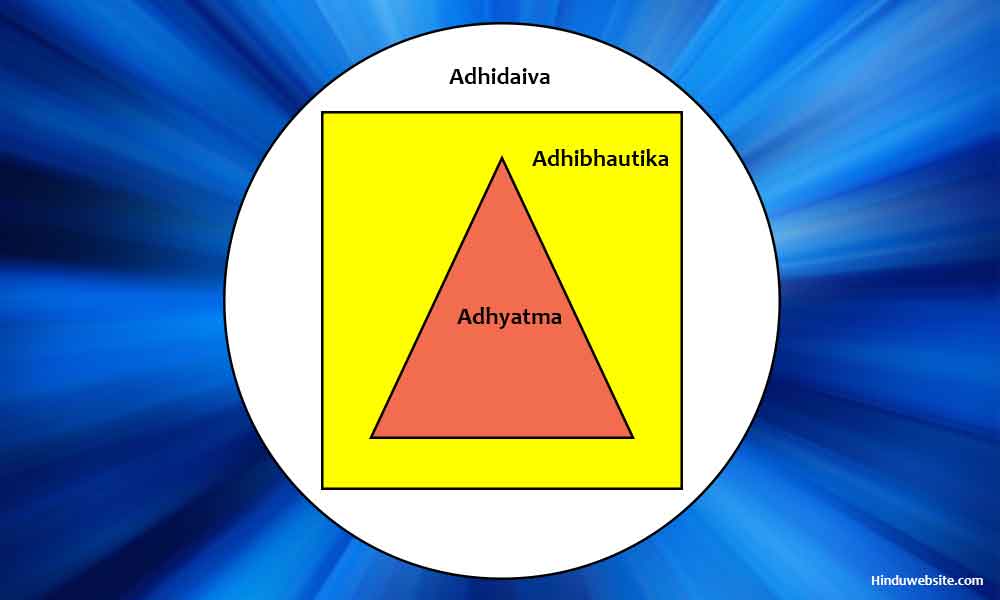
The Meaning and Significance of Adhi

The Sanskrit word Adhi (अधि) is used mostly in conjunction with verbs as a prefix. It means over and above and is usually associated with things that convey superiority, authority or lordship. A few examples are adhikara (supervisor), adhidaiva (presiding deity), adhinatha (lord of all lords), adhipathi (ruler), adhikama (overwhelming desire), adhiguna (superior quality), adhibhuta (superior element) and so on. Here, we will mention three important concepts of Hinduism which are associated with adhi namely adhidaiva, adhibhautika and adhyatma.
In Hinduism it is believed that, although Isvara (the lord of all) created the world, established order and regularity (rta), and ordained the world to follow a predetermined path (vidhi), he still endowed the beings with free will so that they could make their own decisions with or without discernment and desires, and bound them to the control of Nature and several presiding laws and conditions, including the law of karma. They are collectively known as Dharma, upon which everything rests in its own space and functionality.
Therefore, the fate of individuals, the lives of beings upon the earth and the course of creation said to depend upon three important factors, which are also discussed in the Bhagavadgita. They are adhyatma, adhibhautika and adhidaiva. Everything that happens upon earth is due to one of these three factors. Together, they make life possible and unpredictable as well. However, the fatalists disagree with this statement. According to them everything (including our free will and the will of others) is preordained and happens due to fate or God (adhidvaia). We may say that in creation Isvara partially withdraws or conceals himself as a part of his play, yielding place for the individual will and Nature, so that maya can enact its role and keep the beings bound to their own delusions, but beyond that everything is fixed and controlled by Brahman only.
Adhyatma means concerning the self or belonging to the self. It refers to all actions which arise from the free will of a living being (mostly humans) due to desires and attachments. The effort to know or realize the self or contemplate upon it is considered adhyatmika or relating to the self. Contemplation upon the self or the supreme self is known as adhyatmika chintana. Most of the actions in our lives are self-willed. The events and consequences which arise from them fall under the adhytama. The higher an organism is on the evolutionary scale, the greater is the role of adhyatma in its life.
Adhibhautika refers to all actions which arise from the physical world which includes the actions of other human beings and living and nonliving entities upon earth, including the actions and movements of Nature, elements and natural forces. Since we are inseparable from the world, the actions of these entities also influence our destinies and the course of our lives. They may also partly be responsible for our suffering. For example, if the government imposes additional taxes upon people, the consequences arising from it to you or to others pertain to the adhibhuatika influence.
Adhidaiva refers to acts of God, fate and inexplicable events which cannot rationally be explained. The events which arise due to fate or chance or luck are deemed adhidaiva. As you can see, our lives are shaped mainly by these three forces. The role of the supreme lord (adhi daiva) in our lives is invisible, mysterious, difficult to foresee or expect. Some of them may be due to karma or the actions of others. Therefore, what we consider fate or acts of God may partly arise as a consequence of our own actions (adhyatma) or those of others (adhibhautika).
Suggestions for Further Reading
- Fate And Free Will In Hinduism
- Four Paths to Practice Dharma in Hinduism
- Four Types of Intelligence
- God and Creation in Hinduism
- How Reality Manifests in Creation
- Lessons from the Dance of Kali, the Mother Nature
- Why is Hinduism Called Sanatana Dharma?
- Life’s Lessons from Mother Nature
- Maya in the Bhagavadgita
- Parinama Vada or the Law of Causation in Hinduism
- The True Meaning of Prakriti in Hinduism
- Hinduism and the God of Death
- Ahimsa, Nonviolence or Non-injury
- Ajivikas - Their History and Philosophy
- The Concept of Ajnana, Ignorance in Hinduism
- Me, Myself and Maya
- What is the Purpose of Human Life?
- The Meaning of Vedanta and Siddhanta Explained
- The Mathematical Basis of Life As a Play of Numbers...
- Essays On Dharma
- Esoteric Mystic Hinduism
- Introduction to Hinduism
- Hindu Way of Life
- Essays On Karma
- Hindu Rites and Rituals
- The Origin of The Sanskrit Language
- Symbolism in Hinduism
- Essays on The Upanishads
- Concepts of Hinduism
- Essays on Atman
- Hindu Festivals
- Spiritual Practice
- Right Living
- Yoga of Sorrow
- Happiness
- Mental Health
- Concepts of Buddhism
- General Essays